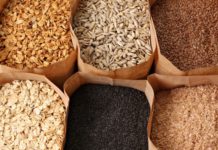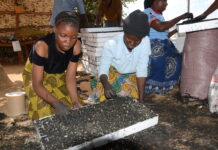
Prof Willem Boshoff, Associate Professor in the Department of Plant Sciences at the University of the Free State (UFS), is one of the authors of an article: ‘Long-read genome sequencing of bread wheat facilitates disease resistance gene cloning’, which was recently published in the prestigious science publication, Nature Genetics.
This work, which resulted from a research project funded by KAUST in Saudi Arabia, also includes – apart from Prof Boshoff – the collaboration of Prof Simon Krattinger’s group at the King Abdullah University of Science and Technology (KAUST), and locally Dr Renée Prins and her team at CenGen.
Prof Boshoff says in this paper that they reported on the first genome sequence for a South African wheat (cultivar Kariega) and the successful cloning of the Yr27 stripe rust resistance gene. According to him, the interest in better understanding the stripe rust resistance of Kariega resulted from the almost immune field response of this cultivar to local races of the pathogen since the first appearance of the disease on wheat in South Africa (SA) during the 1996 season.
“The Yr27 resistance gene is one of three stripe rust resistance sources present in Kariega, and the second to be cloned. Cloning the Yr27 revealed the exact position of the gene in the roughly 14 700 000 000 base pairs that constitute the Kariega genome and facilitate the more efficient deployment of the gene in future gene stacks,” he says.
Food security
He states that the sequencing of Kariega, which has been the bread-baking quality standard in South Africa for many years, not only contributes to our understanding of the underlying mechanisms of its long-lasting stripe rust resistance, but also allows further research opportunities to unravel the genetics behind the unique and superior bread-making characteristics of this cultivar.
This work is yet another step towards ensuring Zero Hunger, Goal 2 of the Sustainable Development Goals of the United Nations. Prof Boshoff, who has extensively studied rust pathogens occurring on small grain crops in South Africa, says growing crops with genetic resistance to diseases of economic importance contributes to the lower risk of epidemic outbreaks, as well as lower input costs as producers become less reliant on chemical control. The research is in support of sustainable wheat production, ensuring the continuous availability of essential food sources such as bread.
Sharing results
Throughout his career of the past 27 years, data from his work has been shared regularly with producers as part of an early warning system against rust pathogens, which allowed them to optimise their control strategies.
“My research did facilitate the identification, characterisation, and use of germplasm with rust resistance from local and international breeding programmes, which have subsequently been exploited in local studies and breeding to improve our cultivars,” says Prof Boshoff.
When asked about his plans for the next two years, Prof Boshoff says he wants to continue to be relevant in this field. “I strongly believe in teamwork to grow research capacity and efficiency and will continue to seek new opportunities and foster the many collaborative projects that I am involved in,” he concludes.






